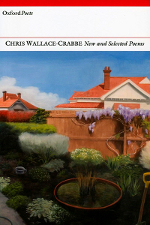
New and Selected Poems by Chris Wallace-Crabbe
Carcanet Press, 2012
Now a youthful 79, the Melbourne poet, Chris Wallace-Crabbe, has been an important figure in Australian poetry since the early 1960s. As a teacher, scholar, anthologist and organizer – as well as a poet with at least fourteen volumes to his name – Wallace-Crabbe has been central to much that has happened in Australian poetry over the past fifty years, especially in Melbourne. As with his friend, the late Peter Porter, Wallace-Crabbe’s lightly-worn erudition and distinctive sense of humour have ensured that his work is admired by many poets (and readers) across the aesthetic divisions in our poetry reaching back to the 1970s. Varied though it may be, one would have to be a determined curmudgeon not to like his work.
It is possible that this playfulness in Wallace-Crabbe’s work may sometimes have led to its being slightly misunderstood and, in some quarters, undervalued. The present book is his third ‘Selected’ (the first two came out in 1973 and 1995 respectively) and offers a tight but indicative sample from his work across half a century. Apart from his first two collections – which the poet himself once described as ‘four square and syllogistic’ – Wallace-Crabbe is revealed throughout as a kind of playful, existentialist philosopher who, because of his Hopkins-like love of language, has been driven to use the richness of poetry rather than the drier prose medium that serves most philosophy.
As a philosopher Wallace-Crabbe is unsystematic – analogous to Nietzsche perhaps but more cheerful. Although, unlike his late poet-friend Peter Steele, SJ, Wallace-Crabbe finds no particular meaning in the universe he tends temperamentally to the optimistic. In his first book, A Wintry Manifesto, he offered us the now well-known lines: ‘our greatest joy to make an outline truly / And know the piece of earth on which we stand.’ The last stanza of the last of the new poems in this book (‘That Which Is’) gives us something similar, albeit in a more offhand manner: ‘Yet we view it all from here / With our feet resting firmly on the physical / And all the impinging solidly made right here / Of pods, fibre, fur, sepals, gumnuts, one parrot feather / And whatever otherhoods dear / Old salty nature has on hand for us. // For us to touch and question: minds in space.’ The phrase, ‘dear / Old salty nature’ has a tone Wallace-Crabbe often strikes and is quite a contrast to the ‘four square’ seriousness of the first quotation, reflecting, as the latter does, the manner of poets such as A.D. Hope and James McAuley who were so dominant in this country in the 1950s.
Wallace-Crabbe’s philosophy is best sensed by reading the book through chronologically from p.55 and then finishing with the new poems with which the book begins. While there is a sense of forward development there is also a sense of return to a few central issues. In ‘The Foundations of Joy’ (1976) the poet concludes: ‘to be naked for a little while / in the very jaws of time / is all that I am asking / of this mad world. / Listen: / silence is playing like an orchestra.’ Much later, in ‘We Being Ghosts Cannot Catch Hold of Things’ (2001), he suggests that ‘… Meaning is a blind god / who limps through the actual world // seeking any attachment, / looking for good company.’ There are plainly not going to be any easy answers here.
Occasionally, and movingly, Wallace-Crabbe abandons (or perhaps complicates) his philosophical stance by writing poignantly straightforward poems of grief (particularly following the early and unexpected death of one his adult sons) as well as political poems that have all the compression and impact of a Brecht or Neruda. The characteristic playfulness suddenly disappears and becomes, at most, a gentle irony. We are suddenly given access to a much deeper level of emotion – on both a private and a public level. For all the ontological charm of the breezy philosophical poems, it is poems such as ‘An Elegy’, ‘Erstwhile’, ‘Other People’ and the quite recent ‘Rendition’ that linger in (or even scarify) the mind.
In the final stanza of ‘Erstwhile’ the poet talks of a phone call from his dead son’s girlfriend: ‘Oh yes, she rang today, / had taken somebody out to see your grave / near the forked white trunk, /and we were sad together / on the phone, for a hard while / thinking of you, long gone now. Hence. / Where? Where are you? / In poor fact I can never come to grasp / the meaning of it all, supposing / that to be what religion’s all about. / The loss remains behind / like never being well.’ The directness, the puzzlement, the unmitigated pain make it a very different poem from the book’s more typical ones. It is, I would surmise, a very difficult poem to write – for all its seeing simplicity. To lift the personal to the universal the tone has to be exactly right.
With the political poems a slightly different note is struck. In ‘Other People’ and ‘Our country boys go off to war’ (in his sequence to the memory of Peter Porter) Wallace-Crabbe fiercely questions the political decisions that send men (and sometimes women now) off to conflicts in remote places which may or may not prove to be in the national interest. In ‘Other People’, Wallace-Crabbe notes the death of four uncles in World War I and adds, with a characteristically jocular edge: ‘Four is a lot for uncles, / A lot of lives, I would say.’ The later poem, ‘Our country boys go off to war’, in just two five-line stanzas, revisits the theme: ‘If they’re in luck, the country boys / will come back home, however changed / by wounds, or sights or suffering, / their outlook darkened by old men / in cities they have never seen.’









